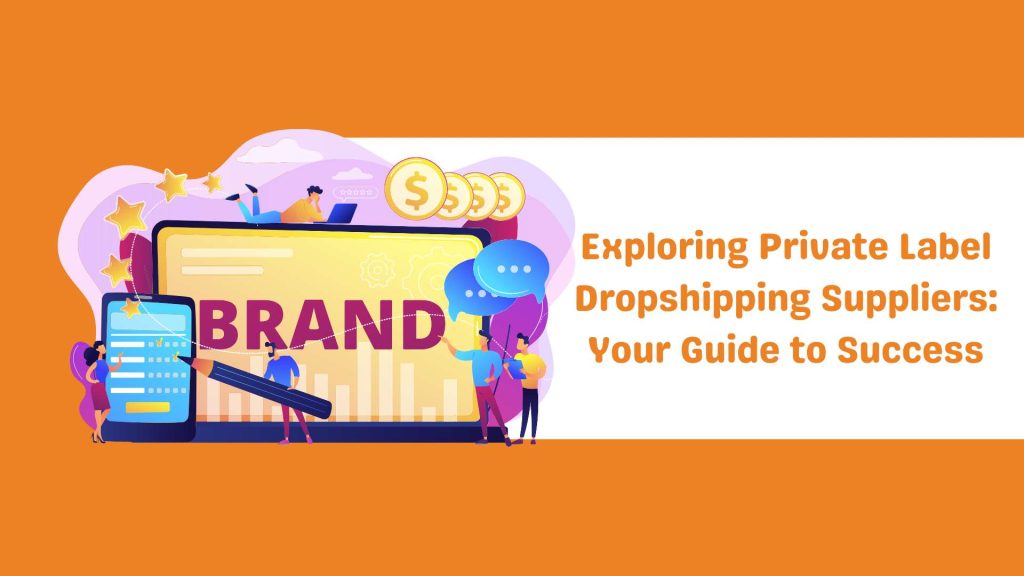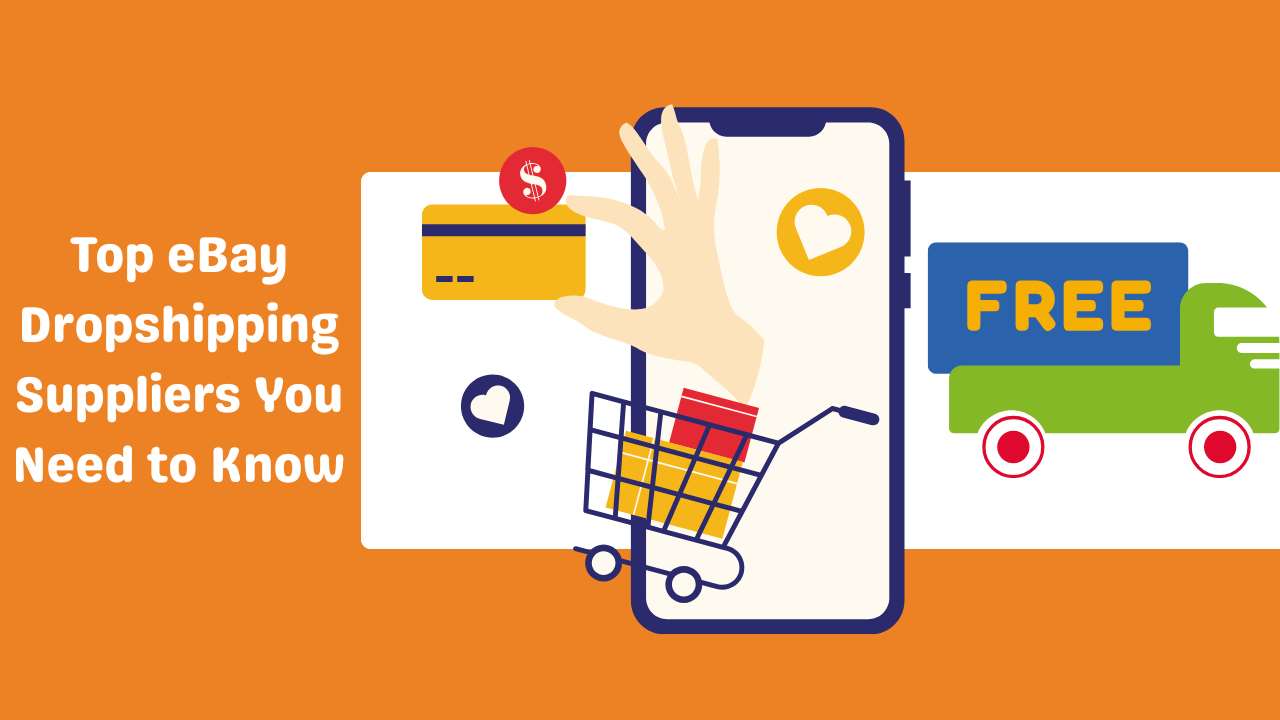Private label dropshipping suppliers are essential players in the eCommerce landscape, offering businesses a chance to sell unique branded products without holding inventory. This article delves into the vital role these suppliers play in building a flourishing eCommerce business. By efficiently managing logistics, product quality, and branding, private label dropshipping enables entrepreneurs to streamline operations and maximize profitability. This, in turn, transforms how consumers interact with their favorite brands. Let’s take a deep dive into understanding how to select the right partners and cultivate a successful dropshipping venture.
What Are Private Label Dropshipping Suppliers?

Private label dropshipping suppliers are manufacturers that produce goods for retailers to sell under their own brand names. This model allows entrepreneurs to offer distinctive products without worrying about inventory. But here’s the kicker: the advantages of leveraging these suppliers are not just limited to product uniqueness. The ability to create a cohesive brand image becomes attainable, allowing retailers to design their promotional strategies around proprietary products.
When partnering with suppliers, such as branded dropshipping suppliers and private label manufacturers, business owners can customize their packaging to fit their target market’s aesthetic. This branding can significantly influence purchasing decisions, establishing a sense of trust among consumers who prefer known brands over generic alternatives. For example, a retailer might engage with suppliers specializing in private label skincare dropshipping to offer premium beauty products that resonate with eco-conscious consumers.
The operations of these suppliers often reflect a straightforward process. After a retailer places an order, the supplier manages production and logistics, sending products directly to the customer. This setup not only reduces overhead costs but also simplifies inventory management. By choosing China-based private label dropshipping suppliers, businesses can access quality goods at competitive prices. The key takeaway? Establishing a transparent relationship with your suppliers will pave the way to profitability and long-lasting partnerships.
According to Shopify’s private label guide, working with reliable suppliers is the key to brand growth (source).
| Supplier Name | Location | Product Specialization | Shipping Speed |
|---|---|---|---|
| Supplier A | China | Custom Electronics | 5-7 days |
| Supplier B | India | Organic Food Products | 7-10 days |
| Supplier C | USA | Private Label Skincare | 3-5 days |
| Supplier D | Vietnam | Eco-Friendly Household Goods | 6-8 days |
| Supplier E | Bangladesh | Fashion Apparel | 8-12 days |
How Do Private Label Suppliers Operate?
Navigating the landscape of private label dropshipping suppliers reveals intriguing operational dynamics. First and foremost, the relationship between retailers and suppliers is based on mutual benefit. Retailers seek customizable products that offer branding flexibility, while suppliers aim to fulfill these demands efficiently. What’s the real story? It boils down to exceptional operational logistics and product quality.
These suppliers often offer custom dropshipping solutions that cater to specific business needs, allowing retailers to tailor product features, packaging, and even marketing materials. For instance, a small business wanting to build a niche brand can partner with factory-direct brand suppliers who understand smaller scale operations and can provide low MOQ private label manufacturers to minimize financial risk.
A prime example is the collaboration between a home décor retailer and a private label supplier offering custom furniture. The retailer defines the materials and design aesthetics, and the supplier handles production, ensuring that every piece reflects the brand identity. This creates a streamlined process where the supplier can scale operations to match demand fluctuations, leading to efficient private label logistics and fulfillment.
Furthermore, building a reputation is crucial for success. By negotiating favorable terms with their selected suppliers, retailers can ensure a robust supply chain that produces high-demand items consistently. Therefore, the core of effective operations centers on cultivating reliable partnerships that emphasize quality products and timely delivery.
| Feature | Importance in Operations |
|---|---|
| Customization Options | Brand differentiation |
| Shipping Speed | Customer satisfaction |
| Quality Control | Reduces returns |
| Minimum Order Quantities | Lowers financial risk |
| Communication Standards | Ensures transparency |
Why Choose Private Label Dropshipping?
The allure of private label dropshipping lies in its capacity to empower retailers with unique branding possibilities. This business model is not only about selling products but also about establishing a brand identity that resonates with target customers. Ready for the good part? Here’s how embracing private label dropshipping can transform your business.
First, it enables retailers to tap into various niches. Working with specialized private label pet supplies dropshippers, for example, allows entrepreneurs to cater to pet owners looking for unique, quality products that stand out from generic options. Similarly, organic food private label suppliers can help businesses provide high-demand organic products, thereby aligning with growing health trends.
Moreover, adopting a private label strategy introduces potential for higher profit margins. Retailers can position their products at premium price points compared to generic alternatives due to perceived value and uniqueness. This strategy also lessens reliance on established brands, ultimately enhancing market competitiveness.
Investing in private label packaging and design can heighten brand appeal, further encouraging customer loyalty. Custom packaging acts as an advertisement in itself, instantly grabbing attention when consumers come across products on store shelves or during online shopping.
Finally, the scalability of private label dropshipping makes it a promising endeavor for small businesses. This approach helps entrepreneurs expand their product line swiftly without the financial burden of inventory holding. As businesses grow, suppliers can accommodate increased order volumes, ensuring operational consistency.
| Benefit | Description |
|---|---|
| Brand Control | Establishes unique market presence |
| Market Niche Opportunities | Targets specific consumer segments |
| Higher Profit Margins | Increases financial profitability |
| Flexible Scalability | Adapts to business growth |
| Enhanced Customer Loyalty | Creates brand identity and trust |
Private Label Dropshipping Niches to Watch
What’s the real story? Not all products are created equal when it comes to private label dropshipping. To stay ahead in 2025, you need to focus on product categories with long-term potential and growing demand.
Here are some of the most promising private label niches:
- Private Label Skincare Products – Driven by personalization and natural ingredients, this niche continues to dominate beauty categories.
- Eco-Friendly Household Goods – As sustainability becomes more important, reusable and biodegradable products are winning consumer trust.
- Pet Products – From natural pet treats to stylish accessories, pet owners are willing to pay more for branded, safe, and unique items.
- Health Supplements – With proper certification, supplement dropshipping provides recurring revenue and strong margins.
- Fitness Gear & Apparel – Home fitness is still booming. Custom-branded items like yoga mats or resistance bands are great for private labeling.
Want to simplify your entry into these high-growth markets?
👉 Runtoagent helps you source top-performing products directly from certified factories, complete with private label customization, packaging, and logistics.
How to Find Reliable Private Label Suppliers

The quest for reliable private label dropshipping suppliers is often a pivotal journey for entrepreneurs. But here’s the kicker: knowing where to look and what to assess is crucial to successful partnerships.
Start by researching suppliers through reputable platforms known for vetting their listings. Websites that aggregate supplier information, such as Alibaba, can point you toward trusted private label dropshipping partners in China and elsewhere. It’s advisable to focus on suppliers with strong reputations and positive reviews. Dig deeper into customer testimonials and case studies showcasing the supplier’s reliability.
Look for affordable private label dropshipping companies for small businesses that understand the financial constraints of new ventures. Establishing a relationship with these suppliers can provide the flexibility needed to grow alongside your business. Additionally, ensure that potential suppliers offer product customization for dropshipping, allowing you to create unique offerings tailored to your target market.
Next, interact with suppliers directly. Ask pertinent questions regarding MOQs, shipping options, and support for product development. Inquire about their experience in managing private label logistics and fulfillment to gauge their capabilities.
Lastly, initiate trial orders to assess product quality firsthand. A well-structured evaluation process can save business owners from long-term issues concerning product quality and fulfillment reliability.
| Criteria | Importance |
|---|---|
| Supplier Experience | Indicators of reliability |
| Customer Reviews | Insights into quality |
| Minimum Order Quantity | Financial flexibility |
| Customization Capabilities | Ability to differentiate brand |
| Communication Standards | Ensures relationship strength |
Who Are the Best Private Label Dropshipping Suppliers for Shopify?
For eCommerce businesses using platforms like Shopify, identifying the best private label dropshipping suppliers is vital. What’s the real story? The right suppliers can streamline operations, optimize the user experience, and ultimately enhance sales.
First, consider those who provide easy integration with Shopify functionalities. Certain suppliers have built platforms specifically designed for seamless connectivity, allowing you to sync inventory lists and manage orders effortlessly. Among these, you’ll often find China-based private label dropshipping suppliers known for competitive pricing and a wide range of products.
Look for best private label dropshipping suppliers for Shopify that specialize in fast shipping options. Customers expect quick delivery, and working with suppliers who can fulfill orders rapidly ensures satisfaction. This ability to provide timely deliveries helps build loyalty, making it easier to retain customers.
Next, assess the products offered. For example, brands offering private label supplements dropshipping or private label skincare dropshipping suppliers have carved out lucrative niches. Businesses must choose suppliers whose product lines resonate with their market demographic.
Additionally, consider the level of customer support the supplier provides. Rapid response times and effective communication can significantly influence your operational success. An engaged supplier will often be a valuable partner in navigating challenges such as demand fluctuations and inventory management.
| Supplier Options | Features |
|---|---|
| Supplier A | Integrates seamlessly with Shopify |
| Supplier B | Offers fast shipping and quality control |
| Supplier C | Specializes in private label supplements |
| Supplier D | Provides eco-friendly product options |
| Supplier E | Focuses on private label beauty items |
What to Look for in a Supplier

Identifying key characteristics of a reliable private label dropshipping supplier is crucial for a successful relationship. Ready for the good part? Here’s a comprehensive breakdown of what to prioritize when evaluating potential partners.
First, assess product quality. Reliable suppliers should provide samples to allow thorough evaluation before any commitment. This initial step is instrumental in mitigating risks associated with poor-quality products that could harm your brand.
Next, shipping capabilities rise to the forefront. Ensure that suppliers can deliver products quickly without compromising quality. Working with suppliers who offer scalable private label supply chain solutions can greatly enhance your ability to respond to customer demand fluctuations efficiently.
Additionally, strong communication is vital. Suppliers should demonstrate responsiveness and transparency in all interactions. An effective line of communication paves the way for smoother operations and swift resolution of any issues that may arise during the partnership. It’s also essential that a supplier supports private label packaging and design, enabling you to present product offerings that align with your brand.
Furthermore, verify the supplier’s experience in the specific niche you’re entering. For instance, companies that specialize in private label pet supplies dropshippers will have targeted knowledge that larger suppliers may lack.
Lastly, pay attention to pricing structures. Ensure that costs align with your budget, allowing you to maintain healthy profit margins while investing in marketing and business expansion.
| Key Characteristics | Importance |
|---|---|
| Quality Assurance | Affects brand reputation |
| Shipping Options | Impacts customer satisfaction |
| Communication Standards | Facilitates smooth operations |
| Industry Experience | Provides niche-relevant insights |
| Pricing Structures | Affects profitability |
How to Build a Private Label Store
Building a successful private label store requires a meticulous approach. But here’s the kicker: the design, product selection, and marketing strategy encompass various facets that contribute to overall success.
First, begin by selecting a niche. What market gap do you aim to fill? Engaging in thorough market research can help identify opportunities for unique product offerings. This research should also review competitors within the chosen niche, allowing for differentiated branding and positioning.
Next, decide on the product range. Collaborate with supplier for private label products to build a portfolio that resonates with your audience. Offering a mix of items that cater to customer preferences enhances the likelihood of repeat business and brand loyalty.
Additionally, brand identity is vital. Invest time in creating an appealing logo, packaging design, and a cohesive online presence. A well-designed website that reflects your brand ethos is essential; it serves as a digital storefront where customer trust can be built.
Furthermore, consider incorporating custom packaging suppliers into your supply chain. Unique packaging can enhance customer experience and make your products stand out among competitors.
Finally, employ digital marketing strategies to promote your private label store. Utilizing social media, content marketing, and pay-per-click campaigns can drive traffic to your site and convert visitors into loyal customers. Developing client relationships through email marketing and loyalty programs can further enhance customer retention.
| Components | Significance |
|---|---|
| Niche Selection | Defines target market |
| Product Range | Enhances customer appeal |
| Brand Identity | Establishes market position |
| Packaging Design | Boosts perception and trust |
| Marketing Strategies | Drives traffic and builds relationships |
What Challenges Might You Face?
While engaging with private label dropshipping suppliers can bring numerous advantages, it is not without its set of challenges. Let’s explore some common pitfalls, and why you should anticipate them.
First, quality control can be a significant concern. Not every supplier guarantees consistency; thus, having a clear quality assurance procedure in place is essential. This means conducting regular assessments and obtaining feedback from customers regarding product quality.
Next, managing fulfillment involves balancing inventory levels effectively. Fluctuating consumer demand can either lead to excess stock or a stockout situation, impacting sales performance. Utilizing reliable suppliers who can scale operations helps navigate these challenges efficiently.
Communication shortcomings can create operational hurdles. If there is a delay in response time from a supplier, it can result in missed opportunities and dissatisfied customers. Establishing robust communication channels and setting clear expectations from the outset can mitigate this issue.
Additionally, navigating shipping logistics can be tricky. Suppliers must deliver items promptly to maintain customer satisfaction; otherwise, the reputation of your brand could suffer. Collaborating with suppliers with proven track records in private label logistics and fulfillment will be an asset.
Lastly, changes in market trends require ongoing adaptation to your product offerings. Make it a priority to stay informed about industry developments that could influence consumer preferences. Engaging with suppliers who are agile can aid in quickly adjusting to such shifts.
| Challenges | Solutions |
|---|---|
| Quality Control | Regular assessments and feedback |
| Fulfillment Management | Collaborate with scalable suppliers |
| Communication | Establish clear channels and expectations |
| Shipping Logistics | Choose suppliers with strong records |
| Market Trend Adaptation | Stay informed and agile |
Private Label vs White Label: Quick Comparison
Let’s clear the confusion—many new sellers don’t know whether they need a private label or a white label supplier. Here’s how to tell the difference and choose the right path for your brand.
Private Label means you have control over product design, specifications, packaging, and branding. It’s ideal for entrepreneurs building a distinctive brand from scratch.
White Label offers ready-made products where only your logo is added. It’s faster and cheaper to launch but limits customization.
| Feature | Private Label | White Label |
|---|---|---|
| Product Customization | High – full control | Low – usually pre-made |
| Branding Flexibility | Full brand ownership | Shared product base |
| Time to Launch | Medium – requires supplier coordination | Fast – ready for market |
| Cost | Higher upfront costs | Lower entry cost |
| Ideal For | Long-term brand building | Quick market entry |
Still not sure which model fits your goals?
👉 Runtoagent can help you assess your business plan and connect you with the right supplier—whether for private label innovation or efficient white label rollouts.
Conclusion
In the realm of eCommerce, private label dropshipping suppliers serve as invaluable partners for brand-building and sales growth. By understanding how to select reliable suppliers, entrepreneurs can create unique products, optimize logistics, and successfully market their private label offerings. From navigating the specifics of building a private label store to tackling potential challenges, these insights pave the way for establishing a strong eCommerce presence. Investing the effort to cultivate these relationships will ultimately lead to enhanced sustainability and profitability in the competitive retail landscape.
Q1: What are private label dropshipping suppliers?
Private label dropshipping suppliers are manufacturers that produce products for retailers to sell under their own brand names without holding inventory.
Q2: Why is private label dropshipping beneficial?
It allows retailers to create unique brands without upfront costs, enabling higher profit margins and greater brand loyalty.
Q3: How do I find reliable private label suppliers?
Conduct thorough research, read reviews, request samples, and inquire about minimum order quantities.
Q4: What should I look for in a dropshipping supplier?
Look for quality assurance, customization options, shipping speed, and sustainability practices.
Q5: How can I market my private label products effectively?
Utilize social media, partner with influencers, and leverage content marketing to increase brand awareness and drive sales.
Runtoagent helps thousands of online brands simplify their supply chain by offering end-to-end private label dropshipping services.







